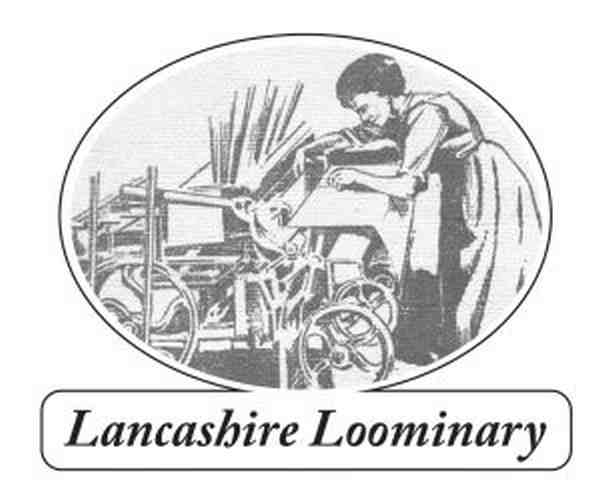The Northern Salvo
Incorporating Weekly Notices, Lancashire Loominary, Sectional Appendices, and Northern Weekly Salvo
Published at Station House, Kents Bank, Lancashire-North-of-the-Sands, LA11 7BB and at 109 Harpers Lane, Bolton BL1 6HU (Lancashire-South-of-the-Sands)
email: paul.salveson@myphone.coop
Publications website: www.lancashireloominary.co.uk
No. 312 August 2023
Salveson’s half-nakedly political digest of railways, tripe and secessionist nonsense from Up North.
Going monthly….
Greetings on August 1st, Yorkshire Day. Over here in Lancashire it’s a wet miserable morning, ‘siling down’ as my late Huddersfield friend and colleague Philip Jenkinson would have said. This is the first ‘combined volume’ of The Salvo and Lancashire Loominary, with the aim of coming out roughly every month. Hopefully there’ll be summat for everyone. Comments are always welcome, either by email or in the ‘comments’ section on the website. If you find you’re getting two copies, let me know and I’ll take one off.
It has been a time of changes, the loss of several good friends and also some major decisions with REPTA, a much-loved railway institution dating back to 1893.

It was set up as ‘The Railway Employees’ Privilege Ticket Association’ and more recently became ‘The Railway Employees’ Passenger Transport Association. In its heyday, around the 1960s, it had about 60,000 members. I was honoured to be REPTA’s patron from 2006. The organisation held its 123rd AGM at Bath AGM last weekend, when some major strategic decisions were made; further announcements will be made later this year.
I’ve been pleased with the response to my new book Lancastrians – Mills, Mines and Minarets. A New History, published by Hurst. More on it below; a few local launches are in the offing (Barrow, Eccles, Salford, Rochdale). It costs £25 (hardback) but Salvo readers can get a 25% discount by entering LANCASTRIANS 25 at the checkout on Hurst’s website www.hurstpublishers.com
Booking Offices: need for a re-think all round
The announcement in early July that hundreds of station booking offices were to close (mostly in England) was greeted with a storm of opposition. There has been a partial retreat, with a longer period being given for responses to what is an ill-thought through proposal, reminiscent of the mass closures of the Beeching years in the 1960. Tens of thousands of submissions have already been made and  numerous petitions circulated which oppose the closures. A lot of attention has focused on the problems it would cause for elderly and disabled people. However it goes well beyond that and I’d say that a lot of people value the help and advice from a trained railway person when they are making complex journeys. If it takes about four weeks to train a railway employee to become competent in ticket retailing, how can we expect members of the public to get the best deal just by ‘going on the internet’. I suspect that thousands of people get ripped off every week by selecting a more expensive ticket for their journeys. Perhaps intending rail passengers should be sent on a compulsory training course.
numerous petitions circulated which oppose the closures. A lot of attention has focused on the problems it would cause for elderly and disabled people. However it goes well beyond that and I’d say that a lot of people value the help and advice from a trained railway person when they are making complex journeys. If it takes about four weeks to train a railway employee to become competent in ticket retailing, how can we expect members of the public to get the best deal just by ‘going on the internet’. I suspect that thousands of people get ripped off every week by selecting a more expensive ticket for their journeys. Perhaps intending rail passengers should be sent on a compulsory training course.
The closures do not make much sense from a commercial perspective as well as a social one. 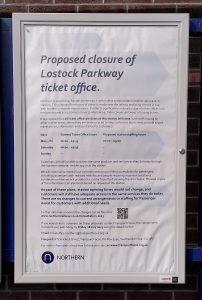 Railway companies will lose revenue as a result of people not making their journey by rail and using the car instead. We have been bombarded with a figure of 12% of ticket sales being done through booking offices (the figure is more like 20% on Northern) but what would be interesting to know is that is the percentage of revenue taken through booking offices? I suspect it will be higher as people use booking offices for longer and more complex journey rather than using the platform TVM.
Railway companies will lose revenue as a result of people not making their journey by rail and using the car instead. We have been bombarded with a figure of 12% of ticket sales being done through booking offices (the figure is more like 20% on Northern) but what would be interesting to know is that is the percentage of revenue taken through booking offices? I suspect it will be higher as people use booking offices for longer and more complex journey rather than using the platform TVM.
My own position (and that of the Rail Reform Group, see www.railreformgroup.org.uk) has been clear for a long time. Whilst accepting that the current traditional model of a station booking office is no longer appropriate in many places, with a very limited range of ‘products’ being on offer, that should lead to what has been called a ‘re-purposing’ rather than blanket closure of booking offices. Where the location is right, stations could become retail centres with the traditional ticket sales (and information) service complemented by other activities. It really isn’t ‘rocket science’. When did you see a petrol station that only sold fuel?
If someone is sat behind a window selling tickets for say four trains an hour, that will, in some cases, allow time for doing other things which add value to the booking office’s function. In the case of smaller stations with less frequent trains, more innovative approaches should be tried including offering them (with financial help) to displaced staff who might want to develop their own businesses. OK, perhaps there wouldn’t be many but I know some who would make excellent ‘station entrepreneurs’. Offering booking offices, rent-free, to small businesses including social enterprises, with training given on ticket issuing, is an approach that could work in some places.
The closures should be halted and time given to explore a range of options which may be appropriate in different locations. In the meantime, if you haven’t objected yet, please do so. The standard format is TicketOffice.Northern (or whichever operator)@transportfocus.org.uk (see poster image above).
Fiddling while Rome burns
It has been hot out there, in that far-away land called ‘Europe’. Soaring temperatures have caused chaos and the continent has been cut off from mellower climes, like Bolton’s. Perhaps that of Uxbridge too. The recent by-elections were expected to lead to a triple Tory defeat. The fact they hung on, very narrowly, to Uxbridge has been put down to public opposition to the ULEZ (Ultra Low Emission Zone) proposals being put through by the Greater London mayor, Sadiq Khan. Keir Starmer was upset at not winning the seat and urged Khan to ‘reflect’ on his ULEZ proposals. It seems that the mayor has made suitable reflections and is continuing with his proposals.
The impact of Uxbridge has been very significant and the Tories, always good to spot a bandwagon to jump on, are calling for measures such as ULEZ to be scaled back. Not that they’re against ‘doing something on Climate Change’, mind, just that ‘we need to exercise a bit of caution’. Which is all quite predictable.
The Tories have always tried to paint themselves as ‘the motorists’ friend’, but it would be good to see more of a fightback from Labour. I mean getting really dirty and accusing the Tories of complicity in 500 child deaths each year through air pollution in Greater London. As an aside, some friends from Heywood visited London recently and were struck by the palpable smell of polluted air, even in more suburban south London – and not that Heywood is an unpolluted nirvana! Sunak has made his lack of interest in ‘the environment’ (other than in opposing relatively modest measures to do something) but where is Starmer in all this? It’s hard not to detect a similar lack of interest in all this ‘green nonsense’. The party line is very clearly trying to appear moderate in all things and let the Tories dig their own political grave. So when devolved mayors like Khan (and Andy Burnham and Steve Rotheram up North) do something that’s a bit more radical, it sends off warning bells in Labour HQ. Lisa Nandy is now saying that the mayors won’t get tax-raising powers which makes a joke of real devolution.
There’s been a lot in social media saying that Starmer is just a closet Tory (dredging up the ghost of Tony Blair). Actually, he isn’t. Starmer is part of a long right-wing Labour tendency that’s statist, centralist and authoritarian. It isn’t the only Labour tradition: there is an alternative approach stretching back to the Independent Labour Party which is decentralist, inclusive and open. Yet it has become a minority trend within Labour, ceding more and more political ground to the Greens and the left-of-centre nationalist parties such as Plaid and the beleaguered SNP. Principled socialists like Neal Lawson who advocate such dangerous notions as PR and working with other progressive parties, are threatened with expulsion.
Come next year’s General Election we’ll be told to hunker down, bite our tongues and vote Labour, as the best way to get the Tories out. Yet I have to say that a Starmer-led majority Labour Government doesn’t hold out much attraction to me, much as I want to see the back of this awful lot. I’d be far happier with a minority Labour administration which depends on Lib Dem, Green and other support (and it’s about time Sinn Fein dropped their abstentionist policy). A condition for the Lib Dems’ backing should be the introduction of radical measures to address The Climate Emergency, a fair voting system and democratic regional government (at least).
Station House progress: A Railway Reading Room?
The renovation work on Station House at Kents Bank is pretty much complete. A few ideas have been swishing around regarding the cellar (actually a nice, dry place). It lends itself well as a library and space for small meetings for up to about ten people. I’m planning to move most of my railway book collection up to Kents Bank, keeping the
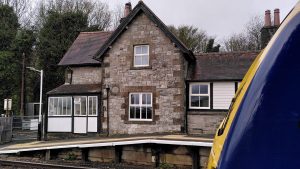
Lancashire and general items in Bolton. One option with the railway material is to develop a modest library with an emphasis on rural and community railways. It could include a ‘railway book club’ which meets occasionally and facilities for researchers to use the collection. Early days but watch this space. Meanwhile, The Beach Hut Gallery, next door, has plenty of good stuff on view, and is open Thursday to Sunday 11.00 to 16.00h.
Eminent Northerners
One of the things I tried to do in my ‘Lancastrians’ book was to highlight some men and women who have made important, but neglected, contributions to Northern politics and culture. Two that stand out are Mary Higgs and Solomon Parrington. Both have railway connections. Mary Higgs set up the ‘Beautiful Oldham Society’ in the 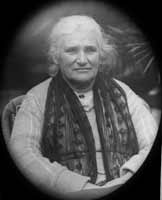 early 1900s and badgered the railway companies to let the society develop bits of unused railway land to grow vegetables. Sound familiar? Very much a forerunner of the ‘incredible edible’ movement. Some companies were more receptive than others. Mary went on to initiate the ‘garden suburb’ project in Oldham, with houses built along co-operative lines. She figures in Allen Clarke’s novel ‘The Red Flag’, with a fictionalized re-working of her adventures when she went ‘on the tramp’ to examine conditions in women’s lodging houses.
early 1900s and badgered the railway companies to let the society develop bits of unused railway land to grow vegetables. Sound familiar? Very much a forerunner of the ‘incredible edible’ movement. Some companies were more receptive than others. Mary went on to initiate the ‘garden suburb’ project in Oldham, with houses built along co-operative lines. She figures in Allen Clarke’s novel ‘The Red Flag’, with a fictionalized re-working of her adventures when she went ‘on the tramp’ to examine conditions in women’s lodging houses.
Not far from Oldham lies Middleton, birthplace of Solomon Partington in 1844. Some readers will know of him through the Winter Hill mass Trespass of 1896. He came from a family of silk weavers which was an important local industry. His early professional life was spent with the Lancashire and Yorkshire Railway. He was employed as a station master, probably at Middleton, before moving to Birkdale. He left the railways after being wrongly accused of swindling the company and became a journalist on The Leigh Journal, owned by the Bolton-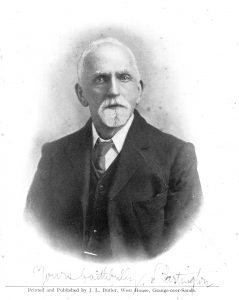 based Tillotson Group. He was involved in local radical politics through the Liberal party and organized ‘the March of The Thousand Lads’ to campaign for better leisure facilities for working class boys and girls. After moving to Bolton he played a leading part in the 1896 Winter Hill Trespass and later stood as an independent candidate for West Ward, getting elected. His final years were spent in Grange-over-Sands writing a history of Lancashire dialect. He died in 1927 and is buried in Grange Cemetery. The Bolton Evening News paid tribute to “a trenchant and fearless writer who used the Press in full measure, though never unfairly, for the advance of schemes for the public good.”
based Tillotson Group. He was involved in local radical politics through the Liberal party and organized ‘the March of The Thousand Lads’ to campaign for better leisure facilities for working class boys and girls. After moving to Bolton he played a leading part in the 1896 Winter Hill Trespass and later stood as an independent candidate for West Ward, getting elected. His final years were spent in Grange-over-Sands writing a history of Lancashire dialect. He died in 1927 and is buried in Grange Cemetery. The Bolton Evening News paid tribute to “a trenchant and fearless writer who used the Press in full measure, though never unfairly, for the advance of schemes for the public good.”
Bath time
We headed down to Bath for the REPTA AGM last weekend (see above). We had a long journey down by car, owing to strikes on the Saturday. We stopped off at The Saracen’s Head at Symonds Yat East, a beautiful spot on the Wye. Just down from the pub is the site of the old station on the Monmouth – Ross-on-Wye line which closed in 1959.
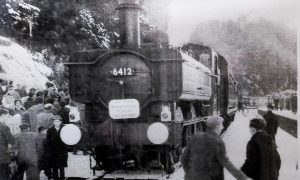
Pleasingly, the pub had some photos the ‘last day’ on January 4th, when GW Pannier 6412 was specially turned out for the occasion. What a great line that must have been, and what a loss. The only public transport remaining is the ferry which plies its way across the river from outside the pub, permitting a visit to the Old Ferrie Inn just a bit further up. You need to make sure you don’t miss the last ferry as it’s a long way round.
Bath is one of those places I generally try to avoid, preferring less well-visited places. However, I must say I was impressed with the place. I had time to visit Green Park Station, where I caught a train to Templecombe down the old Somerset and Dorset in summer 1965, about six months before closure. It was hauled by a BR standard tank
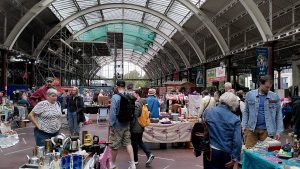
80044 if you want to know. Today, the station is nicely preserved and had a thriving antiques market in full flow. We were staying at The Doubletree Hilton on Walcot Street which is adjacent to the bohemian part of the city with some great little shops, cafes and pubs,
We returned via Monmouth and Hereford, making a special stop at Junction Railwayana in Tintern where certain items were purchased. If the weather hadn’t been so awful we’d have stopped longer to look at the magnificent abbey and have lunch in the old station tea rooms.
Into the Forest
After our stop at Symonds Yat we had some time to explore the Forest of Dean, a fascinating place which is unlike anywhere else. It still has small-scale coal extraction, hewn by the ‘free miners’ of Dean. We called in at Hopewell Colliery which has an exhibition about mining in the Forest, with underground tours. We had a look at the Dean Forest Railway which was operating with ‘Pannier’ haulage. We reached Dean
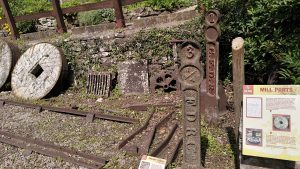
Heritage Centre, located in an old tannery, by a roundabout route – but it was worth the visit. Amongst many industrial artefacts there’s a great display about Dennis Potter who came from the area and wrote extensively about it, including parts of ‘The Singing Detective’. The towns and villages have more a feel of the industrial North rather than rural Gloucestershire. The mining tradition encouraged a flourishing socialist culture which I suspect may still be active today. I used to subscribe to The Wye Valley and Forest of Dean Clarion, edited by Alistair Graham who died last year. The area was criss-crossed by colliery railways, many of which are now cycle trails. At Coleford there’s a railway museum in the old station yard with a miniature railway operated Saturday afternoons. Sadly we missed it. Just down the road there’s the Perrygrove Railway, a miniature railway operating along the course of the old line.
Railway Pigs, Donkeys and other Animals
Visiting Pilling the other day, for Harold Elletson’s funeral, reminded me of the old Garstang and Knot End Railway, traces of which are still visible. It was a standard gauge light railway that ran from Garstang and Catterall station, on the main line, through small settlements out to Knott End (the railway never bothered with the extra ‘t’ in the name).
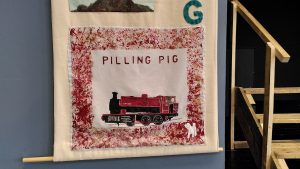
One of the early locomotives had a very shrill whistle which sounded a bit like a pig squealing. hence the name. The title ‘Pilling Pig’ broadened to include any loco that operated the line. Although the line closed well before Beeching, the ‘Pilling Pig’ is still remembered. There’s even a plinthed Hudswell Clarke 0-6-0 saddletank at Stake Pool which celebrates the steamy porker. Should be said that the loco never worked the line and spent most of its time on the NCB colliery system in Mountain Ash, where I photographed it hauling a heavy coal train.
Inspired by the ‘Pig’ I asked around my facebook friends for other colloquial train names and it’s a long list, including (so far) three ‘Donkeys’ (Delph, Marlow and Dursley), The Spratt and Winkle (West Croydon – Wimbledon), The Dudley Dodger (from Snow Hill to Dudley), The Burton Dick (Huddersfield – Kirkburton), The Kendal Tommy (Kendal to Garnge-over-Sands) and several more. Please keep them coming! I’m particularly interested to hear about surviving ‘named’ trains. On the Furness Line the last train of the day to Barrow from the south is still called ‘The Whip’. Why? The last train on a Saturday night up the Rhondda Valley was called ‘The Rodney’. Again, why? Who he? The evening Newcastle-Chathill train was called ‘The Rattler’, when it was Pacer-operated. Is it still rattling? More suggestions please!
Salvo Shorts
Angina Monologues I was diagnosed with ‘stable angina’ a few months ago, following chest pains. I have to say the service from the NHS has been pretty good, though slightly ‘fits and starts’. After initial worries they don’t seem to think it’s anything too serious though I’m being sent off to Bolton Royal Hospital for an ‘angiogram’ shortly. A great pity that I can’t get there by train – the Bolton Great Moor Street to Manchester Exchange ran right past the hospital. Maybe one day we’ll get a tram but well after my clogs have popped I suspect.
Harold Elletson My friend Harold Elletson died a few weeks ago, at the young age of 62. His funeral was in the impressive St John’s Church in Pilling, attended by a very large group of friends and family. I got to know Harold through our ‘radical devolution’ project. He set up the Northern Party and stood as candidate in 2015, but got what could best be called a modest vote. He had previously been Consrvative MP for Blackpool North and became disillusioned with the Tories’ anti-European stance (amongst other things). He was a proud Lancastrian and had many strings to his bow. We shall not see his like again.
Lancastrians: Mills, Mines and Minarets – a new history It’s now available, published by the highly-respected publishers Hurst whose catalogue is well worth a look at it. See https://www.hurstpublishers.com/catalogues/spring-summer-2023/.
The publisher’s blurb says says: “This long-overdue popular history explores the cultural heritage and identity of Lancashire. Paul Salveson 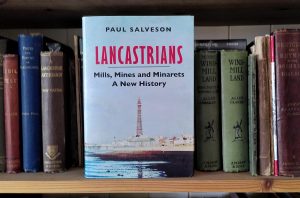 traces to the thirteenth century the origins of a distinct county stretching from the Mersey to the Lake District—‘Lancashire North of the Sands’. From a relatively backward place in terms of industry and learning, Lancashire would become the powerhouse of the Industrial Revolution: the creation of a self-confident bourgeoisie drove economic growth, and industrialists had a strong commitment to the arts, endowing galleries and museums and producing a diverse culture encompassing science, technology, music and literature. Lancashire developed a distinct business culture, its shrine being the Manchester Cotton Exchange, but this was also the birthplace of the world co-operative movement, and the heart of campaigns for democracy including Chartism and women’s suffrage. Lancashire has generally welcomed incomers, who have long helped to inform its distinctive identity: fourteenth-century Flemish weavers; nineteenth-century Irish immigrants and Jewish refugees; and, more recently, New Lancastrians from Asia, Africa and Eastern Europe. The book explores what has become of Lancastrian culture, following modern upheavals and Lancashire’s fragmentation compared with its old rival Yorkshire. What is the future for the 6 million people of this rich historic region?”
traces to the thirteenth century the origins of a distinct county stretching from the Mersey to the Lake District—‘Lancashire North of the Sands’. From a relatively backward place in terms of industry and learning, Lancashire would become the powerhouse of the Industrial Revolution: the creation of a self-confident bourgeoisie drove economic growth, and industrialists had a strong commitment to the arts, endowing galleries and museums and producing a diverse culture encompassing science, technology, music and literature. Lancashire developed a distinct business culture, its shrine being the Manchester Cotton Exchange, but this was also the birthplace of the world co-operative movement, and the heart of campaigns for democracy including Chartism and women’s suffrage. Lancashire has generally welcomed incomers, who have long helped to inform its distinctive identity: fourteenth-century Flemish weavers; nineteenth-century Irish immigrants and Jewish refugees; and, more recently, New Lancastrians from Asia, Africa and Eastern Europe. The book explores what has become of Lancastrian culture, following modern upheavals and Lancashire’s fragmentation compared with its old rival Yorkshire. What is the future for the 6 million people of this rich historic region?”
The book has chapters covering culture, politics, sport, leisure, industry, religion as well as a ‘Cook’s Tour’ of the county (mostly by train). It explores the Lancastrians who left for new lives in America, Canada, Russia and South Africa, as well as the ‘New Lancastrians’ who have settled in the county since the 14th century. There are about forty ‘potted biographies’ of men and women who have made important (but often neglected) contributions to Lancashire.
The book is hardback, price £25. Salvo readers can get a 25% discount by going to the publisher’s website (www.hurstpublishers.com) and enter the code LANCASTRIANS25 at checkout.
Book Talks
I’ve done several talks about my new book ‘Lancastrians’, including events in Bolton, Blackrod, Preston, Stretford and Grange-over-Sands. Future events include Barrow Public Library on August 17th at 14.00 and September 13th at Eccles Local History Society. Friday September 15th I’m at the Working Class History Museum, close to Salford Crescent station, 14.00. Then Bolton Family History Society on October 4th , Grange Photographic Society October 16th and Rochdale (Edwin Waugh Dialect Society) on November 14th.
Still in Print (at special prices!)
ALLEN CLARKE: Lancashire’s Romantic Radical £6.99 (normally £18.99)
Moorlands, Memories and Reflections £15.00 (£21.00)
The Works (novel set in Horwich Loco Works) £6 (£12.99)
With Walt Whitman in Bolton £6 (9.99)
Last Train from Blackstock Junction (published by Platform 5 Books). A collection of short stories about railway life in the North of England. Salvo readers can get the book at a specially discounted price, courtesy of Platform 5 Publishing. Go to https://www.platform5.com/Catalogue/New-Titles. Enter LAST22 in the promotional code box at the basket and this will reduce the unit price from £12.95 to £10.95.
The Settle-Carlisle Railway (published by Crowood £24) – can do it for Salvo readers at £16
See www.lancashireloominary.co.uk for full details of the books (ignore the prices shown and use the above – add total of £3 per order for post and packing in UK)
